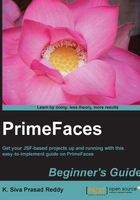
上QQ阅读APP看书,第一时间看更新
Time for action – displaying tooltip for UI components
Let us see how to display tooltips on various events, with different effects and containing HTML elements, such as images, by performing the following steps:
- Create a form with input fields and add a
<p:tooltip>component to display the tooltip using the following code:<h:form title="Tooltip demo form"> <p:panel header="Form with Tooltips"> <h:panelGrid columns="3"> <p:outputLabel value="EmailId:"/> <p:inputText id="emailId" value=""/> <p:tooltip for="emailId" value="Please enter Email Id (Ex: admin@gmail.com)"/> <p:outputLabel value="FirstName:"/> <p:inputText id="firstName" value=""/> <p:tooltip for="firstName" showEvent="focus" hideEvent="blur" value="Please enter FirstName"/> <p:outputLabel value="LastName:"/> <p:inputText id="lastName" value=""/> <p:tooltip for="lastName" showEffect="slide" hideEffect="explode" value="Please enter LastName"/> <p:commandLink id="photo" value="OptimusPrime"/> <p:tooltip for="photo"> <p:graphicImage value="/resources/images/optimusprime.jpg"/> </p:tooltip> </h:panelGrid> </p:panel> </h:form>
What just happened?
We have used the <p:tooltip> component to display tooltips with custom effects and events. Also, we have used the <p:tooltip> component to display HTML content such as images using <p:graphicImage>.
Using global tooltips
We can bind tooltips globally to all clickable elements with the title attribute instead of specifying for each element separately.